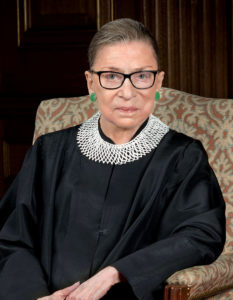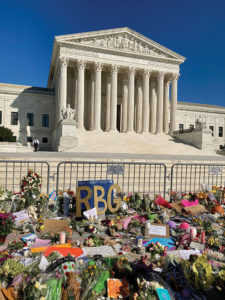Notoriously Humanistic: In Praise of Ruth Bader Ginsburg’s Jurisprudence

We lost a champion of humanist values and liberal jurisprudence with the death of Supreme Court Justice Ruth Bader Ginsburg on September 18. One of the most powerful women in US history, she changed fundamental laws before she ever put on the robe and then remained a powerhouse of dissent against tyranny, bigotry, and sexism.
Humanists are especially indebted to Ginsburg for her long history of preserving the separation of church and state and protecting reproductive rights. In Burwell v. Hobby Lobby Stores, Inc. and Little Sisters of the Poor Saints Peter and Paul Home v. Pennsylvania, Justice Ginsburg stood fast on both issues.
In the Hobby Lobby case, the Supreme Court addressed whether employers could exempt themselves from providing contraceptive coverage under the Affordable Care Act (ACA). The employers, namely David Green and his family, proffered a religious accommodation asserting that contraceptive coverage created a “substantial burden” on their religion, thus violating the Religious Freedom Restoration Act. While the majority, led by Justice Samuel Alito, agreed with the employers, Ginsburg vehemently dissented: “In a decision of startling breadth, the Court holds that commercial enterprises, including corporations, along with partnerships and sole proprietorships, can opt out of any law (saving only tax laws) they judge incompatible with their sincerely held beliefs.” Hobby Lobby indeed created a breadth of religious accommodation previously unheard of in legislation and Supreme Court jurisprudence.
This ruling further offended the long history of preserving reproductive rights for women. Reiterating the necessity of these rights, Ginsburg emphasized that “[t]he ability of women to participate equally in the economic and social life of the Nation has been facilitated by their ability to control their reproductive lives….. Persuaded that Congress enacted RFRA to serve a far less radical purpose, and mindful of the havoc the Court’s judgement can introduce, I dissent.”
The “havoc” Ginsburg referred to presented itself in the Little Sisters case decided on July 8 of this year. Following Hobby Lobby in 2014, broad exemptions (the moral exemption and self-certification exemption) were created to align with the ruling. In Little Sisters, these exemptions were challenged as violating the ACA. While the majority determined these exemptions were permissible, Ginsburg reminded the majority of its longstanding precedent. “In accommodating claims of religious freedom, this Court has taken a balanced approach, one that does not allow the religious beliefs of some to overwhelm the rights and interests of others who do not share those beliefs,” Ginsburg wrote in the opening of her dissent. “Today, for the first time, the Court casts totally aside countervailing rights and interests in its zeal to secure religious rights to the nth degree.” Indeed, these exemptions proved to be far more extensive than the mere accommodations brought before the Supreme Court in the Hobby Lobby case. With the moral exemption and self-certification exemption, between 70,500 and 126,400 women stood to lose contraceptive coverage.
The dichotomy between religious exercise and individual rights was again on display in Master Cakeshop, Ltd. v. Colorado Civil Rights Commission, in which the court was asked whether Jack Phillips (a business owner creating wedding cakes) could deny serving a same-sex couple based on his religious beliefs against such marriages. Notably this case resolved on procedural grounds, never turning to the merits of whether the cake shop owner’s religious beliefs trumped the couple’s right to be free of discrimination. Nonetheless, Ginsburg’s dissent pointed to the error of not holding for the couple. The majority opinion noted that “it is a general rule that [religious and philosophical] objections do not allow business owners and other actors in the economy and in society to deny protected persons equal access to goods and services under a neutral and generally applicable public accommodations law.” The opinion further noted: “Colorado law can protect gay persons, just as it can protect other classes of individuals, in acquiring whatever products and services they choose on the same terms and conditions as are offered to other members of the public.”
Yet, the court emphasized the Colorado Civil Rights Commission’s handling of a separate case. There, a man named William Jack requested a specific cake from three separate bakeries. The cake was to be in the shape of an open Bible and include an image of two grooms holding hands in front of a large cross with a big red “X” over them. The rest of the cake was to be adorned with Bible verses condemning homosexuality. All three bakeries rejected the specific cake and the commission ruled in favor of the bakers, finding no religious discrimination against Jack. According to the Supreme Court, the commission did not afford the religious cake shop owner Phillips the same accommodation it did to the other cake shop owners.
Ginsburg accurately distinguished the cases, noting “[t]he bakers would have refused to make a cake with Jack’s requested message for any customer, regardless of his or her religion.” Instead, “[h]e was treated as any other customer would have been treated—no better, no worse.” In contrast, the couple in the Masterpiece case, Dave Mullins and Charlie Craig, “simply requested a wedding cake: They mentioned no messages or anything else distinguishing the cake they wanted from any other wedding cake Phillips would have sold.” Yet, she argued, “Philips would not sell to Craig and Mullins, for no reason other than their sexual orientation, a cake of the kind he regularly sold to others.” This case left the question of whether a business may discriminate based on religious belief for another day. With the death of Ginsburg, one can only hope that day is not on the horizon.
Justice Ginsburg also played a pivotal role in recent church-state cases, stressing again and again the errors of the court’s conservative majority. In last year’s American Legion v. American Humanist Association, the court skirted precedent and paved a new jurisprudence regarding the Establishment Clause. The majority opinion, again led by Justice Alito, created a new exemption for religious displays, claiming a religious display loses its religious symbolism with the passage of time. As Ginsburg aptly pointed out in her dissent, “the Court erodes [our] neutrality commitment, diminishing precedent designed to preserve individual liberty and civic harmony in favor of a ‘presumption of constitutionality for longstanding monuments, symbols, and practices.’” She directed the court to the history of the Establishment Clause, rather than the history of a monument:

Mourners leave their well-wishes in front of the Supreme Court in the days after Ginsburg’s death. (Photo by Jennifer Bardi)
For, as James Madison observed, the government is not “a competent Judge of Religious Truth.” When the government places its “power, prestige [or] financial support…behind a particular religious belief,” Engel v. Vitale, 370 U.S. 421, 431 (1962), the government’s imprimatur “mak[es] adherence to [that] religion relevant…to a person’s standing in the political community,” Cnty. of Alleghany v. American Civil Liberties Union, Greater Pittsburgh Ch., 492 U.S. 573, 594 (1989). Correspondingly, “the indirect coercive pressure upon religious minorities to conform to the prevailing officially approved religion is plain,” Engel, 370 U.S. at 431. And by demanding neutrality between religious faith and the absence thereof, the Establishment Clause shores up an individual’s “right to select any religious faith of none at all.” Wallace v. Jaffree, 472 U.S. 38, 53 (1985).
The religious symbolism of a Latin Cross, which stands on a traffic median in Bladensburg, Maryland, wasn’t lost on Ginsburg. “As I see it, when a cross is displayed on public property, the government may be presumed to endorse its religious content.” Thus, she argued, “[b]y maintaining the [Latin Cross] on a public highway, the Commission elevates Christianity over other faiths, and religion over nonreligion.”
Just this year Ginsburg voiced opposition against the public funding of private religious schools. In Espinoza v. Montana Department of Revenue, the Supreme Court addressed a tax credit program aimed at providing scholarships for private schools. However, the program resulted in scholarships going to religious private schools. Considering this, Montana’s supreme court struck the program in its entirety pursuant to its no-aid provision in the state constitution. Families seeking a scholarship to a private religious school filed suit alleging the decision violated rights under the Free Exercise Clause of the First Amendment. The Supreme Court agreed. This case is of special note as it did not deal with the Establishment Clause. Instead, the claim focused solely on whether the Free Exercise Clause demanded access to the public funds regardless of the no-aid provision. Notably, a prior case in 2017, Trinity Lutheran Church of Columbia, Inc. v. Comer, held that a religious organization could not be denied a benefit it was otherwise eligible for solely based on its religious character. However, this was limited to nonsectarian aid (specifically in the resurfacing of playgrounds).
Ginsburg patently disagreed with the majority in Espinoza, specifically arguing that there could be no discrimination since the program, in its entirety, had been struck down: “Past decisions in this area have entailed a differential treatment occasioning a burden on a plaintiff’s religious exercise. This case is missing that essential component.” She accurately noted that the state supreme court ruling made “secular and sectarian schools alike…ineligible for benefits,” thus “the decision cannot be said to entail differential treatment based on petitioner’s religion.”
“Among all the Supreme Court justices in the history of our republic, Ginsburg ranks alongside Thurgood Marshall as having done the most to advance the humanist ideal of an ethical society with equal rights and equal justice for all, irrespective of their identity,” American Humanist Association President Sunil Panikkath noted in acknowledging her death. Indeed, Ruth Bader Ginsburg was a pillar of humanity and wisdom, who will be gravely missed.
